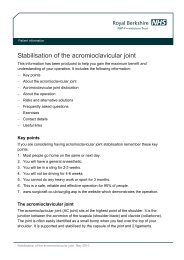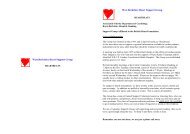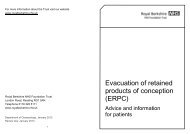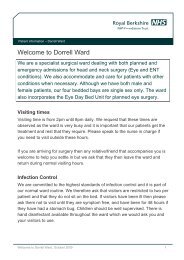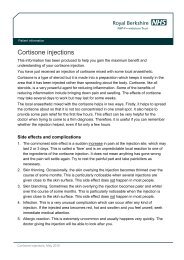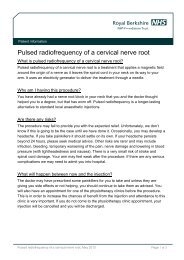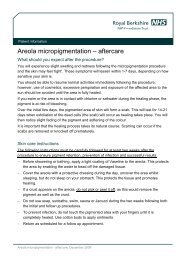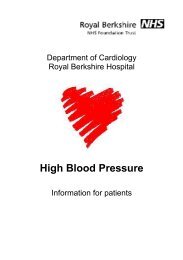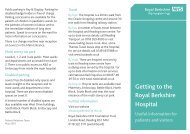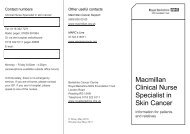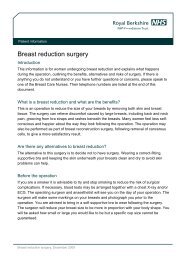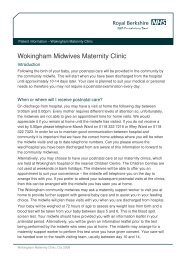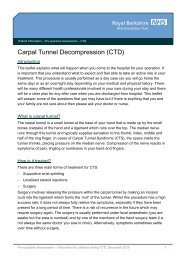Information for patients undergoing parathyroidectomy - The Royal ...
Information for patients undergoing parathyroidectomy - The Royal ...
Information for patients undergoing parathyroidectomy - The Royal ...
Create successful ePaper yourself
Turn your PDF publications into a flip-book with our unique Google optimized e-Paper software.
Patient in<strong>for</strong>mation – Pre-operative Assessment Clinic<br />
<strong>In<strong>for</strong>mation</strong> <strong>for</strong> <strong>patients</strong> <strong>undergoing</strong> <strong>parathyroidectomy</strong><br />
Introduction<br />
This leaflet will explain what will happen when you<br />
come to the hospital <strong>for</strong> your operation. It is<br />
important that you understand what to expect and<br />
feel able to take an active role in your treatment.<br />
Your surgeon will have already discussed your<br />
treatment with you and will give advice about what<br />
to do when you get home. This leaflet will answer<br />
some of the questions that you may have but if<br />
there is anything that you and your family are not<br />
sure about, then please read “Coming into hospital”<br />
folder <strong>for</strong> further in<strong>for</strong>mation about your stay in<br />
hospital. You can also visit the Trust website to find<br />
out more www.royalberkshire.nhs.uk/<strong>patients</strong>__visitors/your_stay_in_hospital<br />
What is a <strong>parathyroidectomy</strong>?<br />
Parathyroidectomy is the removal of one or all of your parathyroid glands. You may need to<br />
have this done because one or all of the glands is overactive.<br />
Your specialist will explain to you how many of your parathyroid glands need to be removed,<br />
in order <strong>for</strong> you to give fully in<strong>for</strong>med consent. If you do not understand any of the<br />
in<strong>for</strong>mation please ask, as it is very important <strong>for</strong> you to make the right decision.<br />
<strong>The</strong> parthyroid glands<br />
Most people have four little parathyroid glands in the neck, two on either side near the<br />
thyroid gland. <strong>The</strong> parathryroid glands help control the level of calcium in the blood. An<br />
overactive parathyroid gland increases the level of calcium in the blood, resulting eventually<br />
in weakened bones. In addition, if left untreated, you may develop kidney stones, weakness<br />
in the muscles, decreased alertness or stomach pains.<br />
Are there alternatives to surgery?<br />
Usually <strong>patients</strong> will have tried medication <strong>for</strong> their symptoms. <strong>The</strong> alternative to this surgery<br />
is to decide not to have surgery.<br />
Pre-operative Assessment Clinic – <strong>In<strong>for</strong>mation</strong> <strong>for</strong> <strong>patients</strong> <strong>undergoing</strong> <strong>parathyroidectomy</strong> 1
<strong>In<strong>for</strong>mation</strong> <strong>for</strong> <strong>patients</strong> <strong>undergoing</strong> <strong>parathyroidectomy</strong><br />
Are there likely to be any complications?<br />
Scarring: Surgery of the parathyroid glands is undertaken through a cut, which usually follows a<br />
natural crease in the neck. Usually it heals quite well, leaving only a thin line but in some people<br />
the healing leaves a scar which is more coloured and thicker than the normal scar. This is not<br />
normally predictable but if you have any other scars that have not healed well, please tell the<br />
surgical team.<br />
Voice change: <strong>The</strong>re are small nerves to the voice box which pass close to the parathyroid<br />
glands and may be damaged however carefully the operation is done. <strong>The</strong> effect of damage to<br />
one of these nerves is a weak or husky voice. <strong>The</strong>se changes normally improve with time and<br />
the chance of you having a permanently abnormal voice is less than one in a hundred, (this<br />
means that less than 1%).<br />
Other complications: Like any other operation, complications such as infection, bleeding, etc can<br />
occur.<br />
Potential side effects and complications are exceedingly rare, but we believe it is best to in<strong>for</strong>m<br />
you of these rather than have you develop a complication without being <strong>for</strong>ewarned. <strong>The</strong>se risks<br />
and complications will be explained to you when the surgeon asks you to sign the consent<br />
<strong>for</strong>m <strong>for</strong> the operation.<br />
When do I come to hospital?<br />
You will come into hospital the day be<strong>for</strong>e or on the morning of the operation. This will be<br />
confirmed in a letter from the waiting list office, even if you have already been given a date<br />
by the surgeon.<br />
How quickly will I be up and about?<br />
On the day of your operation you should resume normal activities gradually. Any heavy<br />
lifting or activities that cause strain should be avoided and should be gradually built up to in<br />
the next 2-4 weeks.<br />
You will have your blood calcium checked the next day be<strong>for</strong>e you go home and will be<br />
allowed home if your calcium is normal. Some <strong>patients</strong> may go home the same day.<br />
We recommend that you start doing the recommended exercises (see the end of this leaflet)<br />
as early as possible.<br />
What happens after I am discharged?<br />
<strong>The</strong> wound dressings will be left intact until you see the consultant at your follow up<br />
out<strong>patients</strong> clinic appointment, which is normally two weeks after the surgery. <strong>The</strong> stitches<br />
are usually dissolvable so don’t need to be removed. Your GP will be sent a letter so that<br />
he/she has details of your operation and can help you with any future problems.<br />
When you are at home it is important to watch out <strong>for</strong> any tingling sensation in your body as<br />
this is a sign that your calcium level is low. If you experience any tingling (this usually<br />
Pre-operative Assessment Clinic – <strong>In<strong>for</strong>mation</strong> <strong>for</strong> <strong>patients</strong> <strong>undergoing</strong> <strong>parathyroidectomy</strong> 2
<strong>In<strong>for</strong>mation</strong> <strong>for</strong> <strong>patients</strong> <strong>undergoing</strong> <strong>parathyroidectomy</strong><br />
happens at night after the operation), we recommend that you drink a glass of milk straight<br />
away. If the sensation doesn’t pass, ring the ward to arrange to have your blood calcium<br />
level checked. <strong>The</strong>se symptoms occur because the other glands have become lazy or<br />
underactive. <strong>The</strong> other glands will recover their normal function quickly but you may need<br />
calcium and Vitamin D tablets temporarily after the operation in order to boost your calcium<br />
level.<br />
Work - Most people need about 4-6 weeks off work, but this will depend on what you do. It is<br />
important that you pay attention to your body, and only do as much as you feel able to do.<br />
Driving - You will probably be fit to drive within a week, providing you feel alert and can carry<br />
out an emergency stop with com<strong>for</strong>t. Please check with your motor insurance company<br />
be<strong>for</strong>e you start driving again.<br />
Exercises following a thyroidectomy / <strong>parathyroidectomy</strong><br />
<strong>The</strong>se exercises are designed to keep your neck moving freely following your operation.<br />
<strong>The</strong>y are very gently and should not cause you any pain. You can start to do them on the<br />
day after your operation. If you have any difficulty with any of the movements, please speak<br />
to a doctor, nurse or physiotherapist.<br />
1. Turn your head to the right as far as possible.<br />
2. Turn your head to the left as far as possible.<br />
3. Take your right ear down towards your right<br />
shoulder.<br />
4. Take your left ear down towards your left<br />
shoulder.<br />
5. Bend your head <strong>for</strong>wards onto your chest.<br />
Hold <strong>for</strong> a count of 5.<br />
6. Slowly tip your head back, looking upwards as<br />
far as possible.<br />
7. Keeping your head erect, tuck your chin in and<br />
hold <strong>for</strong> a count of 5.<br />
Do these exercises 3 times each, repeating them twice daily.<br />
Pre-operative Assessment Clinic – <strong>In<strong>for</strong>mation</strong> <strong>for</strong> <strong>patients</strong> <strong>undergoing</strong> <strong>parathyroidectomy</strong> 3
<strong>In<strong>for</strong>mation</strong> <strong>for</strong> <strong>patients</strong> <strong>undergoing</strong> <strong>parathyroidectomy</strong><br />
Useful telephone numbers<br />
Hunter Ward 0118 322 7535<br />
Lister Ward 0118 322 7538<br />
Adult Day Surgery Unit 0118 322 7622<br />
More in<strong>for</strong>mation<br />
B ritish Thyroid Foundation www.btf-thyroid.org/<br />
Pre-operative Assessment Clinic, April 2010<br />
Review due April 2011<br />
Pre-operative Assessment Clinic – <strong>In<strong>for</strong>mation</strong> <strong>for</strong> <strong>patients</strong> <strong>undergoing</strong> <strong>parathyroidectomy</strong> 4



